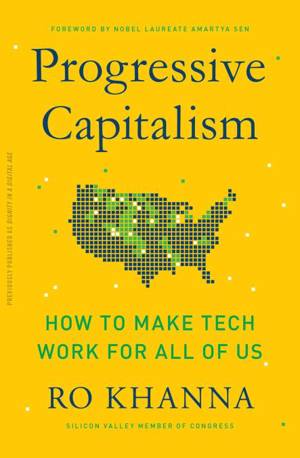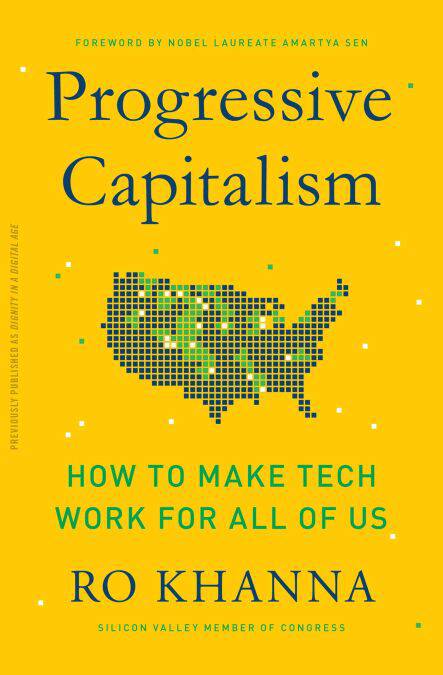
Je cadeautjes zeker op tijd in huis hebben voor de feestdagen? Kom langs in onze winkels en vind het perfecte geschenk!
- Afhalen na 1 uur in een winkel met voorraad
- Gratis thuislevering in België vanaf € 30
- Ruim aanbod met 7 miljoen producten
Je cadeautjes zeker op tijd in huis hebben voor de feestdagen? Kom langs in onze winkels en vind het perfecte geschenk!
- Afhalen na 1 uur in een winkel met voorraad
- Gratis thuislevering in België vanaf € 30
- Ruim aanbod met 7 miljoen producten
Zoeken
€ 15,65
+ 15 punten
Uitvoering
Omschrijving
Congressman Ro Khanna offers a revolutionary, “progressive” (James J. Heckman, Nobel Prize winner and professor of economics at the University of Chicago) roadmap to facing America’s digital divide, offering greater economic prosperity to all. In Khanna’s vision, “just as people can move to technology, technology can move to people” (from the foreword by Amartya Sen, Nobel Laureate in Economics) where “Khanna envisions redistributing opportunities from coastal cities to rural middle-America…An exciting vision, brilliantly rendered.” (Arlie Russell Hochschild, author of Strangers in Their Own Land).
Unequal access to technology and the revenue it creates is one of the most pressing issues in the United States. An economic gulf exists between those who have struck gold in the tech industry and those left behind by the digital revolution; a geographic divide between those in the coastal tech industry and those in the heartland whose jobs have been automated; and existing inequalities in the technological access—students without computers, rural workers with spotty WiFi, and many workers without the luxury to work remotely.
Congressman Ro Khanna’s Progressive Capitalism tackles these challenges head-on and imagines how the digital economy can create opportunities for people across the country without uprooting them. Anchored by an approach Khanna calls “progressive capitalism,” he shows how democratizing access to tech can strengthen every sector of economy and culture. By expanding technological jobs nationwide through public and private partnerships, we can close the wealth gap in America and begin to repair the fractured, distrusting relationships that have plagued our country for fall too long.
Inspired by his own story born into an immigrant family, Khanna understands how economic opportunity can change the course of a person’s life. Moving deftly between storytelling, policy, and some of the country’s greatest thinkers in political philosophy and economics, Khanna presents a vision we can’t afford to ignore. Progressive Capitalism is a “practical and aspirational” (Kimberlé Crenshaw, professor of law at UCLA and Columbia University) roadmap to how we can seek dignity for every American in an era in which technology shapes every aspect of our lives.
Unequal access to technology and the revenue it creates is one of the most pressing issues in the United States. An economic gulf exists between those who have struck gold in the tech industry and those left behind by the digital revolution; a geographic divide between those in the coastal tech industry and those in the heartland whose jobs have been automated; and existing inequalities in the technological access—students without computers, rural workers with spotty WiFi, and many workers without the luxury to work remotely.
Congressman Ro Khanna’s Progressive Capitalism tackles these challenges head-on and imagines how the digital economy can create opportunities for people across the country without uprooting them. Anchored by an approach Khanna calls “progressive capitalism,” he shows how democratizing access to tech can strengthen every sector of economy and culture. By expanding technological jobs nationwide through public and private partnerships, we can close the wealth gap in America and begin to repair the fractured, distrusting relationships that have plagued our country for fall too long.
Inspired by his own story born into an immigrant family, Khanna understands how economic opportunity can change the course of a person’s life. Moving deftly between storytelling, policy, and some of the country’s greatest thinkers in political philosophy and economics, Khanna presents a vision we can’t afford to ignore. Progressive Capitalism is a “practical and aspirational” (Kimberlé Crenshaw, professor of law at UCLA and Columbia University) roadmap to how we can seek dignity for every American in an era in which technology shapes every aspect of our lives.
Specificaties
Betrokkenen
- Auteur(s):
- Uitgeverij:
Inhoud
- Aantal bladzijden:
- 368
- Taal:
- Engels
Eigenschappen
- Productcode (EAN):
- 9781982163365
- Verschijningsdatum:
- 31/01/2022
- Uitvoering:
- E-book
- Beveiligd met:
- Adobe DRM
- Formaat:
- ePub

Alleen bij Standaard Boekhandel
+ 15 punten op je klantenkaart van Standaard Boekhandel
Beoordelingen
We publiceren alleen reviews die voldoen aan de voorwaarden voor reviews. Bekijk onze voorwaarden voor reviews.









